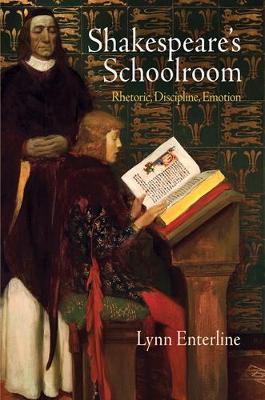Shakespeare's Schoolroom: Rhetoric, Discipline, Emotion

Shakespeare's Schoolroom: Rhetoric, Discipline, Emotion
Shakespeare's Schoolroom places moments of considerable emotional power in Shakespeare's poetry--portraits of what his contemporaries called "the passions"--alongside the discursive and material practices of sixteenth-century English pedagogy. Humanist training in Latin grammar and rhetorical facility was designed to intervene in social reproduction, to sort out which differences between bodies (male and female) and groups (aristocrats, the middling sort, and those below) were necessary to producing proper English "gentlemen." But the method adopted by Lynn Enterline in this book uncovers a rather different story from the one schoolmasters invented to promote the social efficacy of their pedagogical innovations. Beginning with the observation that Shakespeare frequently reengaged school techniques through the voices of those it excluded (particularly women), Enterline shows that when his portraits of "love" and "woe" betray their institutional origins, they reveal both the cost of a Latin education as well as the contradictory conditions of genteel masculinity in sixteenth-century Britain.
In contrast to attempts to explain early modern emotion in relation to medical discourse, Enterline uncovers the crucial role that rhetoric and the texts of the classical past play in Shakespeare's passions. She relies throughout on the axiom that rhetoric has two branches that continuously interact: tropological (requiring formal literary analysis) and transactional (requiring social and historical analysis). Each chapter moves between grammar school archives and literary canon, using linguistic, rhetorical, and literary detail to illustrate the significant difference between what humanists claimed their methods would achieve and what the texts of at least one former schoolboy reveal about the institution's unintended literary and social consequences. When Shakespeare creates the convincing effects of character and emotion for which he is so often singled out as a precursor of "modern" subjectivity, he signals his debt to the Latin institution that granted him the cultural capital of an early modern gentleman precisely when undercutting the socially normative categories schoolmasters invoked as their educational goal.PRP: 232.11 Lei
Acesta este Prețul Recomandat de Producător. Prețul de vânzare al produsului este afișat mai jos.
208.90Lei
208.90Lei
232.11 LeiIndisponibil
Descrierea produsului
Shakespeare's Schoolroom places moments of considerable emotional power in Shakespeare's poetry--portraits of what his contemporaries called "the passions"--alongside the discursive and material practices of sixteenth-century English pedagogy. Humanist training in Latin grammar and rhetorical facility was designed to intervene in social reproduction, to sort out which differences between bodies (male and female) and groups (aristocrats, the middling sort, and those below) were necessary to producing proper English "gentlemen." But the method adopted by Lynn Enterline in this book uncovers a rather different story from the one schoolmasters invented to promote the social efficacy of their pedagogical innovations. Beginning with the observation that Shakespeare frequently reengaged school techniques through the voices of those it excluded (particularly women), Enterline shows that when his portraits of "love" and "woe" betray their institutional origins, they reveal both the cost of a Latin education as well as the contradictory conditions of genteel masculinity in sixteenth-century Britain.
In contrast to attempts to explain early modern emotion in relation to medical discourse, Enterline uncovers the crucial role that rhetoric and the texts of the classical past play in Shakespeare's passions. She relies throughout on the axiom that rhetoric has two branches that continuously interact: tropological (requiring formal literary analysis) and transactional (requiring social and historical analysis). Each chapter moves between grammar school archives and literary canon, using linguistic, rhetorical, and literary detail to illustrate the significant difference between what humanists claimed their methods would achieve and what the texts of at least one former schoolboy reveal about the institution's unintended literary and social consequences. When Shakespeare creates the convincing effects of character and emotion for which he is so often singled out as a precursor of "modern" subjectivity, he signals his debt to the Latin institution that granted him the cultural capital of an early modern gentleman precisely when undercutting the socially normative categories schoolmasters invoked as their educational goal.Detaliile produsului









